This is the fourth in a continuing series of my (highly unofficial) trip reports. For those who came in late, I work for an Agency of the U.S. Government; part of my job is international trade promotion-related activities in support of small business. My job takes me to Eastern Europe once in a while, but arcane Government rules and regulations about travel expenses only allow me reimbursement for about two minutes international long distance time per week. It costs way too much to call North America from Europe, especially from hotels, and I just couldn't afford the cost of all those daily phone calls. Instead, I decided to send out a postcard every day, one that was a stand-alone essay, a chapter of an overall larger diary of that trip that would give the reader a flavor of just what Eastern Europe is all about. So once again there was the challenge: be interesting, be entertaining, and above all, be brief! Talk about pressure! Most every day I was able to find one or two things interesting enough to build a mini-essay around, even if on many evenings, after a long day, composing an essay wasn't something that I much looked forward to.
After reading through this new assembled collection of cards, I've once again added some comments between the postcards for continuity and transition, and to describe some other things there just wasn't enough room to do on the confines of a postcard. And once again, I hope you enjoy reading about my adventures and misadventures as much as I enjoyed being there.
It turned out that I was way too hopeful -- the luggage didn't reappear until
Tuesday night. There were three bags that were missing -- a suitcase filled with
giveaway books for the business meetings, a backpack carefully packed with bottles
of maple syrup (more giveaways, needed one week later for my Slovak hosts), and
my canvas suitcase with all my clothes. Way too much for one person (me)
to handle, but there you are. I swear at the end of each long business trip that
I'll never, never, NEVER pack so much again and that I'll never, ever
be on the road again for as long as I was. But to no avail. This trip took me to
four other countries besides Bulgaria and lasted a full month -- almost a week longer
than my previous marathon record holder, just six months earlier.
The Balkan Mountains are not at all unlike the Blue Ridge of Tennessee and North
Carolina in appearance. They're also the geological feature that gives that part of
Europe its name. Sofia is just 50 kilometers from Bulgaria's border with Serbia, and
maybe another 100 kilometers from all the nastiness that was going on in Kosovo. It
was as close to a war zone as I'd ever been, but there was really no threat. I'd
told people I was more worried about the ubiquitous Eastern Europe mafia than being
caught up in the overflow from a shooting war. Anyway, there was no sign of any ill
feelings toward me, personally, that I noticed -- just the opposite, wherever I went,
the people I met were genuinely happy that I'd come to visit. Shows that the simple
economics of business has it over political posturing every time.
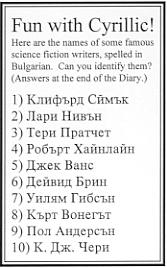 Wednesday, May 19, 1999 (Sofia)
Wednesday, May 19, 1999 (Sofia)It takes some time to figure out the Cyrillic alphabet; some of the characters are
taken from the Greek alphabet, which helps. Even though the written language looks a bit
intimidating, many of the words, when spoken, sound very similar to their Polish and Slovak
counterparts. Ergo, I know how to count to 1,000 in Bulgarian. When I got back to the
hotel, I decided to ask for my room key in Bulgarian, which produced the first surreal
moment of the trip (other than losing my luggage, that is) -- the hotel receptionist told
me, brightly, "You speak Bulgarian well!"
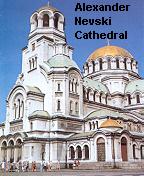 Well, I didn't find any castles,
but there are some amazing cathedrals in Sofia, the most impressive being the Cathedral of St. Alexander
Nevski, which was just a short walk from the hotel where I stayed. The plaza and small parkland
surrounding the cathedral has been taken over during the daytime by a legion of arts & crafts and
souvenir sellers. I'd seen that sort of thing in many other places, but this one was different --
it was the most organized sidewalk bazaar I'd ever seen! All the textile sellers were grouped together
along one side street, while people selling paintings of religious icons were a short distance away,
around the corner. A bit farther along were the sellers of drawings and watercolors of some of Sofia's
landmarks such as the Nevski Cathedral (I bought one of those), and last but not least, there were the
bric-a-brac and tchotcka sellers where you could find small souvenirs and other miscellaneous stuff.
It was much more than just a souvenir and crafts flea market -- it was almost the equivalent of a
department store!
Well, I didn't find any castles,
but there are some amazing cathedrals in Sofia, the most impressive being the Cathedral of St. Alexander
Nevski, which was just a short walk from the hotel where I stayed. The plaza and small parkland
surrounding the cathedral has been taken over during the daytime by a legion of arts & crafts and
souvenir sellers. I'd seen that sort of thing in many other places, but this one was different --
it was the most organized sidewalk bazaar I'd ever seen! All the textile sellers were grouped together
along one side street, while people selling paintings of religious icons were a short distance away,
around the corner. A bit farther along were the sellers of drawings and watercolors of some of Sofia's
landmarks such as the Nevski Cathedral (I bought one of those), and last but not least, there were the
bric-a-brac and tchotcka sellers where you could find small souvenirs and other miscellaneous stuff.
It was much more than just a souvenir and crafts flea market -- it was almost the equivalent of a
department store!
In case you're wondering, the rather elevated exchange rate of over 1,800 lev to the dollar was
the result of several years of out-of-control inflation. The worst year was only about two years
ago, when the annual rate of inflation was just under 1,000 percent. It was so bad, one of my
Bulgarian hosts told me, that if you ordered a cup of coffee at a sidewalk café, the cost rose
slightly between the time you ordered it and the time the bill was presented. So everybody got in
the habit of paying for their restaurant meals at the time they ordered! I cannot fathom how hard
it must have been to make a living then, when your pay check threatened to become, in effect,
waste paper before you could cash it. But the answer was fairly straightforward -- everybody
bought dollars and deutschmarks just as fast as they could get to the money changers. (Some of
them just spent it as fast as they could.) Things are much better now. About two years ago,
control of the money supply was put in the hands of a currency board and the value of the lev was
pegged to the deutschmark. Inflation plummeted, to less than five percent in just one year -- a
remarkable turnaround. Now, instead of being a place to avoid like the plague, Bulgaria has
become a fertile ground for people looking to find investment opportunities. Someone like me,
for instance...
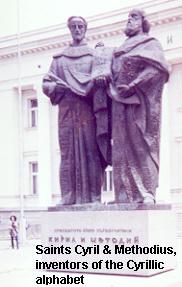 students at a local music and arts college. The ironic part is, I had been looking in various parts
of the city I thought likely places for a concert hall only to discover it was right around the corner
from my hotel!
students at a local music and arts college. The ironic part is, I had been looking in various parts
of the city I thought likely places for a concert hall only to discover it was right around the corner
from my hotel!Actually, I'm guessing there must be other concert halls in Sofia besides that one -- it was pretty
small (only seating about 200) and there's no way an ensemble larger than a chamber music
group could fit on the stage. When I go back to Bulgaria again, and I will, I'll bring with me a
greater understanding of both the layout of the city and the Bulgarian language. So what did I
take away with me when I left Bulgaria? Mostly a sense that I'd found a place in the midst of
rapid change for the better, a place where the kind of work I do is needed. But there was more
than just that. The people are very friendly, the food and beer is delicious, the architecture is
amazing, and the language is a bit intimidating, at least at first. But once you get used to the
Cyrillic alphabet, even that starts to make sense. I surprised myself at the recital by being able to
read and completely understand the one-page program sheet for the evening, which was printed
in Bulgarian. Maybe there's hope for me yet!
 And my first even in Bratislava wasn't too shabby either. After changing some money into
Slovak koruna, I found a nice sidewalk restaurant in the old part of the city, and fortified with
dinner and beer, sat back and watched the world go by for about an hour or so. It turned out there
were plenty of restaurants open in Bratislava's old town, many of them in places where, a few
years ago, there weren't even places. Even in the past six months since my previous trip,
Bratislava has shown some noticeable change, as more and more of the old town comes back to
life and places of business such as restaurants move in. And it will get better yet. Some of the
buildings in the old town square will be breathtakingly wonderful once their re-habs are
complete. Bratislava is a great city to visit, and I don't think I will ever get tired of going
there.
And my first even in Bratislava wasn't too shabby either. After changing some money into
Slovak koruna, I found a nice sidewalk restaurant in the old part of the city, and fortified with
dinner and beer, sat back and watched the world go by for about an hour or so. It turned out there
were plenty of restaurants open in Bratislava's old town, many of them in places where, a few
years ago, there weren't even places. Even in the past six months since my previous trip,
Bratislava has shown some noticeable change, as more and more of the old town comes back to
life and places of business such as restaurants move in. And it will get better yet. Some of the
buildings in the old town square will be breathtakingly wonderful once their re-habs are
complete. Bratislava is a great city to visit, and I don't think I will ever get tired of going
there.
I guess I should mention who the pianist was -- a young Slovak named Dusan Sujan, who played
the whole event (except the last piece) completely from memory. He was very good, and I'll be
looking for him a few years from now to show up as a featured soloist on tour. Anyway, I can
understand why he decided not to commit the last piece to memory; it was an intimidating
modernist piano sonata (can't remember the composer) that was not at all melodic and contained
passages where all ten fingers seemed to work at warp speed. At any rate, it all seemed to
mesmerize the audience, because we didn't realize he'd reached the end until he stood up to take
his bows!
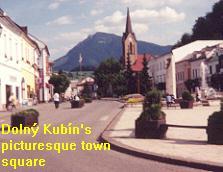 Tuesday night, May 25, 1999 (Dolný Kubín)
Tuesday night, May 25, 1999 (Dolný Kubín)The day's only business meeting was at a glassworks factory, near the city of Puchov (their
offices were in a kastiel, a manor house type of castle), and resulted in a relatively small business
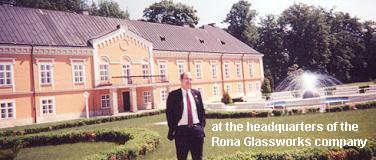 opportunity (about $5 million) for sale and turnkey installation of an industrial-scale gas turbine
to produce both steam and electricity that the company needs. The highlight of the day, though,
was the tour of the facility -- it was fascinating to see how stemmed glasses, vases, and the like
were produced both by automated production line and also the original way, by hand (I'd never
seen so many glassblowers in one place before). I wish all my business meetings could be as
entertaining as this one was!
opportunity (about $5 million) for sale and turnkey installation of an industrial-scale gas turbine
to produce both steam and electricity that the company needs. The highlight of the day, though,
was the tour of the facility -- it was fascinating to see how stemmed glasses, vases, and the like
were produced both by automated production line and also the original way, by hand (I'd never
seen so many glassblowers in one place before). I wish all my business meetings could be as
entertaining as this one was!
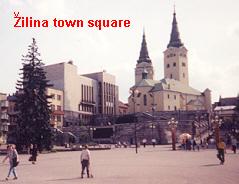 Wednesday night, May 26, 1999 (Zilina)
Wednesday night, May 26, 1999 (Zilina)Unfortunately, one place Zilina's economic resurgence hasn't reached yet is the place where I
stayed the night, the Hotel Slovakia. It's the largest hotel in the city, but to be honest, it's not
very good. There was only two working lamps in the room, the television and telephone each
must have been at least 25 years old, and there wasn't any air conditioning, which pretty much
put you at the mercy of the local weather (and it was an unseasonably warm night that night).
But worst of all was the price structure -- because I was a foreigner, they charged me double the
rate that my Slovak hosts were paying. I understand that the European Union (which Slovakia
wants membership into) is rather upset by this price discrimination (apparently it also applies to
other foreigners besides us "rich" Americans) and wants to put a stop to it. Still, the room rate,
for me, was only $40 a night, so maybe I got what I paid for?
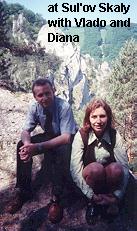 Thursday night, May 27, 1999 (Bratislava)
Thursday night, May 27, 1999 (Bratislava)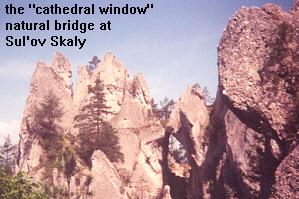 One of the biggest difficulties I have on these long, extended business trips is to stay in touch
with the outside world. I get virtually no budget for telephone calls back to the United States, but
luckily I've found internet connections in almost every population center I've visited. Keeping
up with the latest news of the world can also be a chore. In Bratislava it wasn't too bad, because
English-language newspapers were available and the television system in the place where I
stayed had CNN and SkyNews, once I figured out that you used the satellite receiver controls
rather than change channels directly on the TV. Out on the road trip, though, it was a different
story -- no English-language television at all. Instead, there was an eclectic mix of language and
content that made you scratch your head and wonder what the reasoning was of the people who
set it up. For instance, out in the wilds of north central Slovakia, perhaps a thousand kilometers
from the Black Sea, here was a Bulgarian-language channel on the hotel TV cable system. There
was also a French-language version of Eurosport (instead of the expected German-language one
and the hoped-for English-language version), and several Slovak-language channels, one of them
showing crudely-dubbed versions of old American shows like Miami Vice. And then there was
what can only be described as the 'Full Frontal Nudity Channel', which was mostly a series of
big-breasted babes lounging around on the beach or in a rural setting while a scroll at the bottom
of the screen urged you to call telephone numbers in various countries ("International rates
apply!") to talk to them "live." That's all it seemed to be though I admit it took me a couple of
hours of intent viewing to be sure!
One of the biggest difficulties I have on these long, extended business trips is to stay in touch
with the outside world. I get virtually no budget for telephone calls back to the United States, but
luckily I've found internet connections in almost every population center I've visited. Keeping
up with the latest news of the world can also be a chore. In Bratislava it wasn't too bad, because
English-language newspapers were available and the television system in the place where I
stayed had CNN and SkyNews, once I figured out that you used the satellite receiver controls
rather than change channels directly on the TV. Out on the road trip, though, it was a different
story -- no English-language television at all. Instead, there was an eclectic mix of language and
content that made you scratch your head and wonder what the reasoning was of the people who
set it up. For instance, out in the wilds of north central Slovakia, perhaps a thousand kilometers
from the Black Sea, here was a Bulgarian-language channel on the hotel TV cable system. There
was also a French-language version of Eurosport (instead of the expected German-language one
and the hoped-for English-language version), and several Slovak-language channels, one of them
showing crudely-dubbed versions of old American shows like Miami Vice. And then there was
what can only be described as the 'Full Frontal Nudity Channel', which was mostly a series of
big-breasted babes lounging around on the beach or in a rural setting while a scroll at the bottom
of the screen urged you to call telephone numbers in various countries ("International rates
apply!") to talk to them "live." That's all it seemed to be though I admit it took me a couple of
hours of intent viewing to be sure!
It turned out there were only four of us who went out on the night's adventure. One of the
'usuals' had a conflict, and Diana, our translator, begged off, based mostly on past experience I
think (she's not all that much of a beer drinker). Still, it was a pretty entertaining evening. One
of the group, Peter, said it usually took about three beers for him to become fluent in English. It
did seem that we were all able to communicate better and better as the night went on, though our
random mixture of Slovak and English must have been pretty funny to anyone who could hear us.
After about six or seven pubs and about three liters of beer it was over. A respectable showing,
but well short of a record performance I'm getting just too old for this sort of thing, I think...
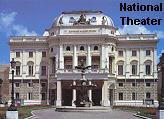 It's my last day in Slovakia, and I used most of it to walk around Bratislava one last time. It's
election day here, but you'd never know it without being told -- during the day I could see no
signs of any polling places or even campaigning, though I did happen across two weddings and
an anti-NATO demonstration. The old town square was busy today -- there was a one-day
festival to benefit Slovakia's handicapped children. Nearby, there was also a "Salvador Dali in
Bratislava" exhibit that I almost got myself thrown out of. And this evening I decided to do
something really different (at least for me) -- I went to the Ballet. It was a modernistic interpretation
of Carl Orff's Carmina Burana and Verdi's Requiem (it all
reminded me a bit of Fritz Lang's film, Metropolis). The poster outside the
National Theater had mentioned that the music was being performed by the London Symphony Orchestra,
but if my Slovak had been better I would have understood that they were using a CD recording,
not the actual orchestra. I guess I wasn't really surprised, especially considering the ticket
price I paid -- 150 Slovak koruna, or a little less than US$4. Importing a major symphony orchestra
at those prices might have been just a little hard to do!
It's my last day in Slovakia, and I used most of it to walk around Bratislava one last time. It's
election day here, but you'd never know it without being told -- during the day I could see no
signs of any polling places or even campaigning, though I did happen across two weddings and
an anti-NATO demonstration. The old town square was busy today -- there was a one-day
festival to benefit Slovakia's handicapped children. Nearby, there was also a "Salvador Dali in
Bratislava" exhibit that I almost got myself thrown out of. And this evening I decided to do
something really different (at least for me) -- I went to the Ballet. It was a modernistic interpretation
of Carl Orff's Carmina Burana and Verdi's Requiem (it all
reminded me a bit of Fritz Lang's film, Metropolis). The poster outside the
National Theater had mentioned that the music was being performed by the London Symphony Orchestra,
but if my Slovak had been better I would have understood that they were using a CD recording,
not the actual orchestra. I guess I wasn't really surprised, especially considering the ticket
price I paid -- 150 Slovak koruna, or a little less than US$4. Importing a major symphony orchestra
at those prices might have been just a little hard to do!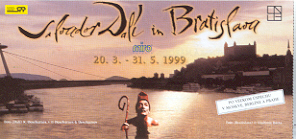 I guess I should mention how I almost got tossed from the Dali exhibit. Most of the display
consisted of small bronze sculptures exhibited in free-standing pedistal glass cases and a
collection (around the walls of the room) of signed and numbered artist prints of various subjects
(many of them more than a bit bizarre -- Dali was a greatly-talented artist, but also one strange
character). There were exactly 100 of these prints, and I noticed that every single one of them
was numbered "1/111." At first I couldn't believe it, so I removed my eyeglasses so I could
check some of them at closer range to be sure. I was leaning over, inspecting one of them, my
nose maybe ten centimeters from the frame, when I noticed I was blocking access from an older
lady. I'm generally quite apologetic in such situations, so I quickly straightened up and took one
step backward, turned away to move on... and my shoulder smacked hard into one of those free-standing
glass cases. It came very close to toppling over -- it rocked once and wobbled quite a
bit, but it remained standing. Two of the museum attendants, who had been passively seated
nearby, nearly jumped out of their skins -- they leaped to their feet with looks of sheer horror on
their faces. After everything had settled down, the had a brief, hushed conversation, then sat
down again, but I noticed that my actions were being very closely observed the rest of the time I
was there. After that, I don't think I'll be visiting any china shops any time soon!
I guess I should mention how I almost got tossed from the Dali exhibit. Most of the display
consisted of small bronze sculptures exhibited in free-standing pedistal glass cases and a
collection (around the walls of the room) of signed and numbered artist prints of various subjects
(many of them more than a bit bizarre -- Dali was a greatly-talented artist, but also one strange
character). There were exactly 100 of these prints, and I noticed that every single one of them
was numbered "1/111." At first I couldn't believe it, so I removed my eyeglasses so I could
check some of them at closer range to be sure. I was leaning over, inspecting one of them, my
nose maybe ten centimeters from the frame, when I noticed I was blocking access from an older
lady. I'm generally quite apologetic in such situations, so I quickly straightened up and took one
step backward, turned away to move on... and my shoulder smacked hard into one of those free-standing
glass cases. It came very close to toppling over -- it rocked once and wobbled quite a
bit, but it remained standing. Two of the museum attendants, who had been passively seated
nearby, nearly jumped out of their skins -- they leaped to their feet with looks of sheer horror on
their faces. After everything had settled down, the had a brief, hushed conversation, then sat
down again, but I noticed that my actions were being very closely observed the rest of the time I
was there. After that, I don't think I'll be visiting any china shops any time soon!
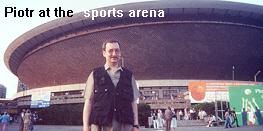 There was actually quite a bit of activity going on in Katowice that evening, especially over at the
flying saucer-shaped sports arena, where the 1970s rock music group Jethro Tull was in town for
a concert on their reunion tour. There were huge lines for that event, which tells you that the
economy has improved to the point where there are sufficient disposable incomes available to
support such concerts -- quite a change from the time of my first trip to Poland, seven years ago.
I was met at the train station by my friend Piotr, who had a long ride of his own the next day -- a
14-hour auto trip to Frankfurt, Germany, for the annual PowerGen Europe conference and trade
show. I'd have been interested in going to that one myself, but it would have further extended an
already too-long trip. Not only that, it cost real money to attend PowerGen, and my trade
promotion program just didn't have sufficient disposable income.
There was actually quite a bit of activity going on in Katowice that evening, especially over at the
flying saucer-shaped sports arena, where the 1970s rock music group Jethro Tull was in town for
a concert on their reunion tour. There were huge lines for that event, which tells you that the
economy has improved to the point where there are sufficient disposable incomes available to
support such concerts -- quite a change from the time of my first trip to Poland, seven years ago.
I was met at the train station by my friend Piotr, who had a long ride of his own the next day -- a
14-hour auto trip to Frankfurt, Germany, for the annual PowerGen Europe conference and trade
show. I'd have been interested in going to that one myself, but it would have further extended an
already too-long trip. Not only that, it cost real money to attend PowerGen, and my trade
promotion program just didn't have sufficient disposable income.
The day's two business meetings were actually the most interesting part of the day. One of them
was hosted by a friend, Andrzej, whom I hadn't seen for about five years. He's now the
President and Managing Director of one of Poland's leading engineering design companies. I
first met him in the autumn of 1990 when he came to the United States with four other energy
experts as part of a two-week "technology tour" sponsored by some U.S.-Poland science and
technology fund; I had been asked to set up their itinerary and accompany them to all the places
they'd be visiting. It was about a week into that trip, and we were all having breakfast at a small
restaurant in Owensboro, Kentucky, when I idly mentioned, in the course of conversation, that I
enjoyed reading and that one of my favorite authors was the science fiction writer, Robert A.
Heinlein. It was all a ploy, of course, to see if any of them recognized the name or were also
science fiction readers. Andrzej picked up on it immediately, and I was stunned to learn he was
the president of the group of science fiction fans in the Katowice area. I'd had no clue up to
then! That actually was a pretty memorable two weeks -- it was one of my first international-
oriented activities at work (I decided I liked that kind of work a lot), and it got me interested in
Eastern Europe as a place for doing business. They had brought with them many bottles of
Polish vodka, which they handed out at business meetings ("...for medicinal purposes only!"),
and in the evenings, they produced some shot glasses, and we stayed up late drinking our
'medicine'. I'm not sure I was any 'healthier' at the end of the trip, but I think if my immune
system could handle that, it could handle just about anything!
One of the day's business meetings was in the town of Libiaz, about 25 kilometers east of
Katowice and only about 12 kilometers north of the city of Oswiecim, more infamously known
as Auschwitz. I didn't go there that day though I had previously, the second time I'd been to
Poland, back in 1993. There was a lot of people there that day. The World War Two
concentration camp at Auschwitz and the neighboring one at Birkenau have been carefully
preserved, and many people are drawn there for whatever the reasons. It was not a pleasant
experience for me. At the visitors center, there's a rather graphic film that provides background
and overview. Inside, most of the site is still pretty much intact. The gas chambers are still
there; when you enter them there's a description of how the mass killings occurred. The inmate
living spaces more resembled a warren -- very confined to the point of claustrophobic; the
catacombs of each building were even more horrific. When you enter the Auschwitz compound,
you pass a gateway beneath the words, "Work will set you free." Being there, I remember, was a
bone-chilling experience, and it's not a place I'd look forward to visiting again.
 Wednesday, June 2, 1999 (Warsaw)
Wednesday, June 2, 1999 (Warsaw)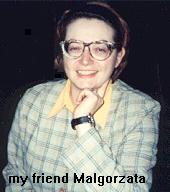 If I'd only known what would happen before the end of the trip, I wouldn't have been quite so
whimsical in that last sentence. At any rate, the one meeting ended by early afternoon, which left
plenty of time for the main sightseeing activity of the day, the Trip to the Top of the Tower. The
ominous-looking Palace of Culture and Science, a 'gift' to the people of Poland by Soviet
dictator Joseph Stalin, is the tallest building in Poland. The view from its 30th floor observation
deck was pretty spectacular -- the entire city was laid out before my eyes and I could see how all
the construction was giving it a new face. My friend Malgorzata, who lives in Warsaw, told me
that the tower is not exactly well-loved -- from time to time there are proposals to tear the thing
down, regardless of expense. And yet, because it's been there for decades, if it were gone,
people would miss it. I know I would -- it's impossible to get lost in Warsaw with that thing on
the skyline!
If I'd only known what would happen before the end of the trip, I wouldn't have been quite so
whimsical in that last sentence. At any rate, the one meeting ended by early afternoon, which left
plenty of time for the main sightseeing activity of the day, the Trip to the Top of the Tower. The
ominous-looking Palace of Culture and Science, a 'gift' to the people of Poland by Soviet
dictator Joseph Stalin, is the tallest building in Poland. The view from its 30th floor observation
deck was pretty spectacular -- the entire city was laid out before my eyes and I could see how all
the construction was giving it a new face. My friend Malgorzata, who lives in Warsaw, told me
that the tower is not exactly well-loved -- from time to time there are proposals to tear the thing
down, regardless of expense. And yet, because it's been there for decades, if it were gone,
people would miss it. I know I would -- it's impossible to get lost in Warsaw with that thing on
the skyline!
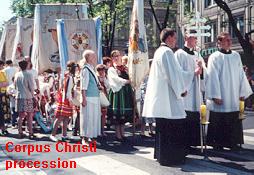 Thursday, June 3, 1999 (Warsaw)
Thursday, June 3, 1999 (Warsaw)As it turned out, some of the souvenir and jewelry shops reopened in the afternoon, so I was able
to buy some of the amber jewelry I'd promised for people back in the United States who knew I
was coming to Poland. The evening's event was a piano recital of music by the Polish composer
Fredryk Chopin, though the performance seemed a bit ordinary. Actually, the most memorable
event of the day was also a bit ordinary, at least its setting was. It happened in the hallway of the
hotel outside my room. A group of Japanese tourists were trying to get into their rooms, and
didn't realize the doors were double-locked -- you had to keep turning the key until the door
opened. I showed them how to do it, and from the looks on their faces, you'd think I was a
miracle worker. I'll take success stories any way I can get them!
 Warsaw traffic seems to have gotten much worse in the past year. The streets have become
nearly clogged with cars and, at times, pedestrians seem to be fair game. On the way to the
Festival in old town, I was nearly run down by some maniac behind the wheel of one of those
little Polish Fiats. You hardly ever see these cars outside the country (they're not street legal in
the United States), but inside Poland they're the scourge of the streets. The Polish Fiat is
probably the smallest car I've ever seen (it's about the length of a hotel bed, and it's powered by
a two-cylinder engine -- you'd swear it was a toy car if you didn't know better) and they all seem
to be piloted by the most aggressive drivers. I've never tried to get into one, but more than once
I've seen them puttering along one of the highways, four grown men crammed inside. Every
time I see one of these cars, it brings to mind an off-color limerick about the "Young Man from
Boston" but I'll leave it to the reader to fill in the last four lines.
Warsaw traffic seems to have gotten much worse in the past year. The streets have become
nearly clogged with cars and, at times, pedestrians seem to be fair game. On the way to the
Festival in old town, I was nearly run down by some maniac behind the wheel of one of those
little Polish Fiats. You hardly ever see these cars outside the country (they're not street legal in
the United States), but inside Poland they're the scourge of the streets. The Polish Fiat is
probably the smallest car I've ever seen (it's about the length of a hotel bed, and it's powered by
a two-cylinder engine -- you'd swear it was a toy car if you didn't know better) and they all seem
to be piloted by the most aggressive drivers. I've never tried to get into one, but more than once
I've seen them puttering along one of the highways, four grown men crammed inside. Every
time I see one of these cars, it brings to mind an off-color limerick about the "Young Man from
Boston" but I'll leave it to the reader to fill in the last four lines.
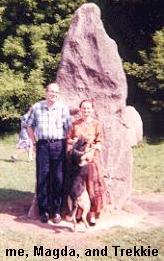 and this trip has been kind of a bust in that area so far only four events in the first three
weeks. No real cultural events like city tours, either. Gosh, I wonder if people will believe me
when I tell them there's not been that much time for such things -- I've been too busy working!
and this trip has been kind of a bust in that area so far only four events in the first three
weeks. No real cultural events like city tours, either. Gosh, I wonder if people will believe me
when I tell them there's not been that much time for such things -- I've been too busy working!I always feel a bit unsettled the day before a travel day; it's almost as if part of me has already
moved on to my next destination. It was pretty much like that on my last day in Poland, which
kept me from thinking about much of anything except preparing for the next day's travel. One
of Malgorzata's friends, Magda, had invited me to a party outside of Warsaw with a group of her
friends, but I had to decline because I still had packing and a lot of other last-minute things to do
that evening, and I was afraid I'd get back to the hotel too late to get them all finished. Instead,
we had a pleasant walk around one of Warsaw's larger parklands, which had apparently been
transformed from an old landfill. There are little restaurants here and there where you can stop
on a hot day for a beer, and there's even a small lake that's very popular for sunbathing and
swimming. This was something I could easily have missed; on the city map it's just a
nondescript area. It's just another example that even though I've been to Warsaw many times,
there's always new things to see and do. It's as if the city reinvents itself every time I go there.
 Sunday, June 6, 1999 (Vilnius, Lithuania)
Sunday, June 6, 1999 (Vilnius, Lithuania)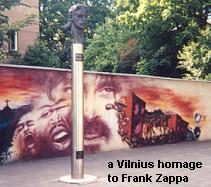 Heaven only knows why and how Vilnius fell in love with Frank Zappa. The statue (actually a
bust of Zappa atop a column) was erected at the end of 1995; it apparently had been intended to
grace the courtyard of an art school, but some of the teachers objected and it was erected instead
on the grounds of a clinic. Somehow I think Zappa would have approved. Of all the museums in
the city, the two I visited were about as different as can possibly be. There's an amber museum
in Vilnius that's filled with the golden stuff as well as some interesting exhibits on how it was
formed millions of years ago and how it's presently 'harvested' and processed into jewelry. And
there's also a building that's not really so much a museum as a place for remembrance -- it's the
former KGB headquarters. The basement of the building is where the political prisoners were
interrogated before being murdered or deported to Siberia. There were small holding cells where
as many as twenty people at a time were packed in. The cells, bathroom/shower facilities
(prisoners were allotted one shower per month), 'recreational' area (about the size of a small
hotel room -- 15 minutes walking time per day) and the like reminded me of the World War Two
concentration camp at Auschwitz -- the only thing missing was the gas chambers, but the KGB
apparently thought a bullet in the back of the head was quicker and more efficient. More than
20,000 political prisoners went into that building (though many if not most had been brought in
on just suspicion). Few came out free, and many didn't emerge at all (remains from some mass
graves are still being identified). It all ended in 1991, when it became evident Lithuania would
regain its independence. The building itself is not in all that good shape, but there's a dilemma
on just how much refurbishing would be appropriate. Supposedly, there are rooms filled with
KGB records that may provide information on many of the missing. It wasn't a pleasant
experience to visit that place, but it was probably a necessary one it will allow me to better
understand the country and its people, and their history. I was told that the real intention of the
museum is to educate future generations about what really happened, so that those who grow up
in a free Lithuania will know what it took to make it that way -- let no one forget. I know I won't.
Heaven only knows why and how Vilnius fell in love with Frank Zappa. The statue (actually a
bust of Zappa atop a column) was erected at the end of 1995; it apparently had been intended to
grace the courtyard of an art school, but some of the teachers objected and it was erected instead
on the grounds of a clinic. Somehow I think Zappa would have approved. Of all the museums in
the city, the two I visited were about as different as can possibly be. There's an amber museum
in Vilnius that's filled with the golden stuff as well as some interesting exhibits on how it was
formed millions of years ago and how it's presently 'harvested' and processed into jewelry. And
there's also a building that's not really so much a museum as a place for remembrance -- it's the
former KGB headquarters. The basement of the building is where the political prisoners were
interrogated before being murdered or deported to Siberia. There were small holding cells where
as many as twenty people at a time were packed in. The cells, bathroom/shower facilities
(prisoners were allotted one shower per month), 'recreational' area (about the size of a small
hotel room -- 15 minutes walking time per day) and the like reminded me of the World War Two
concentration camp at Auschwitz -- the only thing missing was the gas chambers, but the KGB
apparently thought a bullet in the back of the head was quicker and more efficient. More than
20,000 political prisoners went into that building (though many if not most had been brought in
on just suspicion). Few came out free, and many didn't emerge at all (remains from some mass
graves are still being identified). It all ended in 1991, when it became evident Lithuania would
regain its independence. The building itself is not in all that good shape, but there's a dilemma
on just how much refurbishing would be appropriate. Supposedly, there are rooms filled with
KGB records that may provide information on many of the missing. It wasn't a pleasant
experience to visit that place, but it was probably a necessary one it will allow me to better
understand the country and its people, and their history. I was told that the real intention of the
museum is to educate future generations about what really happened, so that those who grow up
in a free Lithuania will know what it took to make it that way -- let no one forget. I know I won't.
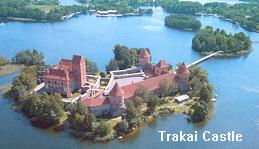 Monday night, June 7, 1999 (Vilnius)
Monday night, June 7, 1999 (Vilnius)I should mention a little about the city of Alytus, which was where my host's company was
located. Lithuania is a relatively small country, with a population of only about three million.
Alytus, with about 70,000 people, is the sixth largest city. The roads on the way there take you
through forests and around lakes, past such curiosities as "Napoleon's Hat" (a small hill that
Napoleon supposedly had built during his foray through the region, in honor of his megalomaniac
self -- or at least his megalomaniac self's hat). The city is bisected by the largest river in the
country, the Nemunas (badly polluted, mostly from sources in Belarus, where the river originates),
the oldest part of the city on one side and the centrum on the other. The centrum has a
pleasant pedestrian mall that serves as the town square, and in the middle of a small park nearby,
there's the statue of the 'Angel of Peace'. That statue is relatively new, erected in 1992 after
Lithuania became independent. The previous occupant of the site was a statue of a Soviet
soldier, in dedication to the Soviet military that "liberated" Lithuania from German control at the
end of World War Two. There are a few other statues like that in Lithuania that may be a bit
harder to get rid of -- they would require too much dynamite!
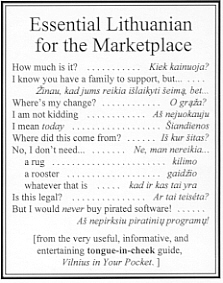 Oh, how little did I suspect what would happen in just a few days! At any rate, there were a lot
of hot days during the trip. It was unseasonably hot for most of the month I was in Europe,
which took a toll on my clean clothes -- shirts I had expected to get two days wear from had to go
into the laundry after a single use. Previous to this, I don't think I'd ever had to have my clothes
washed by a hotel I've stayed at, so I set a personal record by needing it done three times during
the trip. The heat also apparently affects the wardrobe of young women in Lithuania -- the 'new
look' seems to be a mostly-translucent blouse that allows you to see any undergarments (or in a
couple of head-turning instances, the lack thereof). One other personal record for the trip
involved the hotel where I stayed in Vilnius. It was a nice enough place, and even had free(!)
internet access. But it was the most expensive hotel I'd ever stayed that didn't have air
conditioning.
Oh, how little did I suspect what would happen in just a few days! At any rate, there were a lot
of hot days during the trip. It was unseasonably hot for most of the month I was in Europe,
which took a toll on my clean clothes -- shirts I had expected to get two days wear from had to go
into the laundry after a single use. Previous to this, I don't think I'd ever had to have my clothes
washed by a hotel I've stayed at, so I set a personal record by needing it done three times during
the trip. The heat also apparently affects the wardrobe of young women in Lithuania -- the 'new
look' seems to be a mostly-translucent blouse that allows you to see any undergarments (or in a
couple of head-turning instances, the lack thereof). One other personal record for the trip
involved the hotel where I stayed in Vilnius. It was a nice enough place, and even had free(!)
internet access. But it was the most expensive hotel I'd ever stayed that didn't have air
conditioning.
 Wednesday night, June 9, 1999 (Vilnius)
Wednesday night, June 9, 1999 (Vilnius) There was a classical music festival ongoing in Vilnius during the time I was there, though my
last night in town was really the only opportunity I had to take advantage of it. I learned about
the piano recital almost too late; I'd earlier decided to pass on the event at the Philharmonic Hall
(a night of Tango music), and I was almost back to my hotel before I saw a poster advertising the
recital. As it was, I got there halfway through the first piece (the Haydn sonata), but I didn't miss
any of the Beethoven. It was a hectic evening, but it was also a hectic three days in Lithuania,
and I left a lot of shoe leather on the sidewalks getting from place to place. I think I surprised the
U.S. Embassy's commercial specialist, Audrone, by my willingness to expend all that energy to
see the city on foot, to walk up a flight of stairs instead of waiting for an elevator, etc. That's
apparently the Lithuanian way, too, and Audrone told me I was different from every other
American she'd ever met. I'm taking that as a compliment!
There was a classical music festival ongoing in Vilnius during the time I was there, though my
last night in town was really the only opportunity I had to take advantage of it. I learned about
the piano recital almost too late; I'd earlier decided to pass on the event at the Philharmonic Hall
(a night of Tango music), and I was almost back to my hotel before I saw a poster advertising the
recital. As it was, I got there halfway through the first piece (the Haydn sonata), but I didn't miss
any of the Beethoven. It was a hectic evening, but it was also a hectic three days in Lithuania,
and I left a lot of shoe leather on the sidewalks getting from place to place. I think I surprised the
U.S. Embassy's commercial specialist, Audrone, by my willingness to expend all that energy to
see the city on foot, to walk up a flight of stairs instead of waiting for an elevator, etc. That's
apparently the Lithuanian way, too, and Audrone told me I was different from every other
American she'd ever met. I'm taking that as a compliment!
There's a name for this event, of course; it's called a 'White Night'. I've actually experienced
this before, back in 1991 on a mid-May business to Helsinki, Finland (which is even farther north
than Tallinn). Then, as now, the northern horizon took on the appearance of half an hour after
sunset and kept it throughout the night, until the sun rose again about four o'clock in the
morning. From my hotel window, the northern horizon was actually Tallinn harbor, and you
could see passenger ferries and cargo ships as they sailed out beyond where the ocean meets the
sky. Many of them were probably headed for Helsinki, in fact, which is just a few hours by ferry
from Tallinn. The cost to get there is 150 Estonian kroons -- about US$10. Helsinki is so close
and so inexpensive to get there that you could almost consider Tallinn to be a suburb. Or maybe
it's the other way around!
 Friday night, June 11, 1999 (Tallinn)
Friday night, June 11, 1999 (Tallinn)I was a bit overwhelmed by the opera, but I was overjoyed that I finally got to see a live
symphony performance of Rachmaninoff's Third Concerto for Piano and Orchestra. I'd been
wanting to see this one for a long, long time, having missed it by one day in Prague my previous
trip to Eastern Europe. That piece is kind of the holy grail for concert pianists -- some regard it as
the most technically difficult piano composition in current repertoire (it was featured in the
movie Shine, where David Helfgott was told that anyone who wanted to learn it must be insane).
And yet, it's a thing of beauty, with a very powerful ending. The pianist was an extremely
talented Estonian named Ralf Taal, who performed the piece from memory, as is custom for
soloists. And he did it so effortlessly! I've seen videos of other performances of the Rach3, and
it's very intense, as if it's almost a contest of wills between the pianist and the music. But not
this time; you almost felt that he wasn't even being extended by the piece. It certainly extended
my appreciation of the pianist, though!
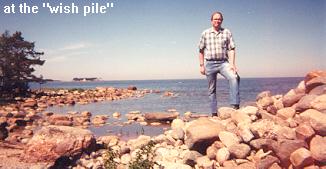 Saturday night, June 12, 1999 (Sagadi Möis)
Saturday night, June 12, 1999 (Sagadi Möis) I'd seen one of those wooden swings before -- at last year's Festival of American Folklife in
Washington, DC. Estonia had been one of the featured countries and they'd built one of them on
the National Mall. You can get as many as twelve people on that kind of swing, and when it gets
going its pendulum swing can be as much as 180 degrees. It's pretty exciting when you get it
going that high -- at the peak of its swing, you're in zero gee for about a quarter of a second. I
had to be very careful not to lose my grip on the support poles, because there were no handholds!
I've been told, if you're daring enough, it's possible to do a '360' on this kind of swing. Nobody
told us what the mortality rate for such a stunt was, though...
I'd seen one of those wooden swings before -- at last year's Festival of American Folklife in
Washington, DC. Estonia had been one of the featured countries and they'd built one of them on
the National Mall. You can get as many as twelve people on that kind of swing, and when it gets
going its pendulum swing can be as much as 180 degrees. It's pretty exciting when you get it
going that high -- at the peak of its swing, you're in zero gee for about a quarter of a second. I
had to be very careful not to lose my grip on the support poles, because there were no handholds!
I've been told, if you're daring enough, it's possible to do a '360' on this kind of swing. Nobody
told us what the mortality rate for such a stunt was, though...
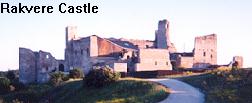 It was the last free day of the business trip, and I spent much of it at a cookout party. The
Estonian company I'm visiting tomorrow has gone far out of its way to make me feel welcome,
and this included a picnic at the home of one of their Board of Directors members. Afterwards,
it was the final cultural event of the trip -- Shakespeare's Macbeth, performed by a local
theatrical group, with the stage located inside the ruins of a medieval castle. It was an amazing
event, but unfortunately, I didn't understand a word of it, as it was all in Estonian. Nevertheless,
since the play is actually set in a castle, this might still have been one of the most authentic
stagings of it ever!
It was the last free day of the business trip, and I spent much of it at a cookout party. The
Estonian company I'm visiting tomorrow has gone far out of its way to make me feel welcome,
and this included a picnic at the home of one of their Board of Directors members. Afterwards,
it was the final cultural event of the trip -- Shakespeare's Macbeth, performed by a local
theatrical group, with the stage located inside the ruins of a medieval castle. It was an amazing
event, but unfortunately, I didn't understand a word of it, as it was all in Estonian. Nevertheless,
since the play is actually set in a castle, this might still have been one of the most authentic
stagings of it ever!The part of the performance that most impressed me was its three-dimensionality. That is, scenes
took place on the stone stairway leading up to the inner ramparts of the castle, and occasionally
some of the actors delivered their lines from up there, five meters above our heads. It wasn't a
case of 'theater in the round' so much as a 'theater in the sphere'. Rakvere Castle itself is pretty
large; there's a lot more to it than just the area set up as the stage. Elsewhere on the castle
grounds there's an area where concerts can be held, with a backdrop of the castle outer wall. It's
too small an area for major acts like Springsteen, but I'm guessing that classical music concerts
would work just fine. And it would be appropriate -- classical music in a classical setting!
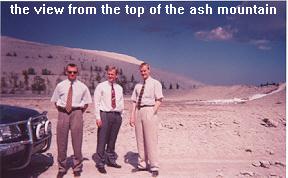 The previous week, during my visit to Panevezys, I'd thought being interviewed by news
reporters was the equivalent of a one-day wonder. Now I'm not sure what to think. Even one of
my Friday's meetings, at Estonia's Ministry of Economic Affairs, had been reported to the news
media and I was startled to hear my name being mentioned later that day in the middle of an
otherwise unintelligible (to me, though not to my host David) radio news program. At any rate,
the trip to the top of the ash heap was pretty exciting, going up some steep, rough inclines that
were impassable without a four wheel drive vehicle. Even though the view from up there was
superb (you could see all the way to the Gulf of Finland), it was so desolate, so totally grey and
lifeless, that when I stepped out of the car, I was tempted to call out, "That's one small step for a
man, one giant leap for mankind!" Probably a good thing I didn't, though. You never know
about a video editor's sense of humor.
The previous week, during my visit to Panevezys, I'd thought being interviewed by news
reporters was the equivalent of a one-day wonder. Now I'm not sure what to think. Even one of
my Friday's meetings, at Estonia's Ministry of Economic Affairs, had been reported to the news
media and I was startled to hear my name being mentioned later that day in the middle of an
otherwise unintelligible (to me, though not to my host David) radio news program. At any rate,
the trip to the top of the ash heap was pretty exciting, going up some steep, rough inclines that
were impassable without a four wheel drive vehicle. Even though the view from up there was
superb (you could see all the way to the Gulf of Finland), it was so desolate, so totally grey and
lifeless, that when I stepped out of the car, I was tempted to call out, "That's one small step for a
man, one giant leap for mankind!" Probably a good thing I didn't, though. You never know
about a video editor's sense of humor.
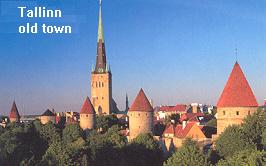 My "media news darling" time in Estonia isn't over yet! Today there were two interviews with
newspaper reporters, one at the beginning of the day in Kohtla-Järve, and one at day's end
back here in Tallinn. In between was a fairly full day of business meetings, including another
four-wheeler trip (the second in two days) to the top of a small mountain of ash left over from
combustion of oil shale in their power plants. I also found out that a sound clip from my
interview yesterday had been played on Estonian national radio several times, in the hourly
news update. This is all too surreal! Maybe this says something about how starved for news
they are here?
My "media news darling" time in Estonia isn't over yet! Today there were two interviews with
newspaper reporters, one at the beginning of the day in Kohtla-Järve, and one at day's end
back here in Tallinn. In between was a fairly full day of business meetings, including another
four-wheeler trip (the second in two days) to the top of a small mountain of ash left over from
combustion of oil shale in their power plants. I also found out that a sound clip from my
interview yesterday had been played on Estonian national radio several times, in the hourly
news update. This is all too surreal! Maybe this says something about how starved for news
they are here?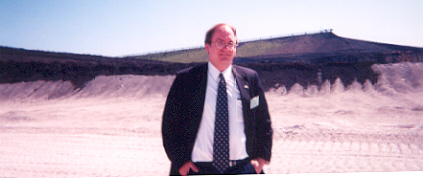
| The more familiar spellings of the writers' names are: 1) Clifford Simak; 2) Larry Niven; 3) Terry Pratchett; 4) Robert Heinlein; 5) Jack Vance; 6) David Brin; 7) William Gibson; 8) Kurt Vonnegut; 9) Poul Anderson; 10) C.J. Cherryh |